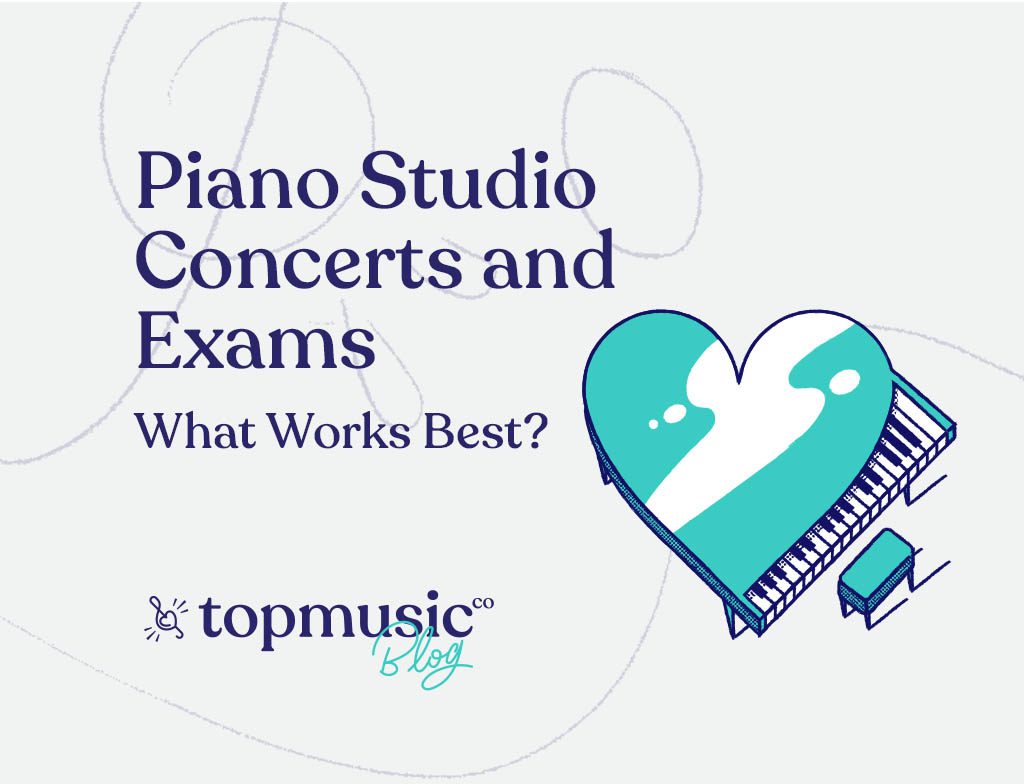 What is the best way for you to use piano studio concerts? Should teachers play at these concerts? How do you deal with pressure from parents who just want their children to do exams?
What is the best way for you to use piano studio concerts? Should teachers play at these concerts? How do you deal with pressure from parents who just want their children to do exams?
These are all queries that arise when discussing and planning performance opportunities for your students. When running a studio with numerous students, it can be difficult to find that perfect balance when it comes to recitals. Students are at different levels, some may be struggling with nerves, and others may not want to perform at all!
It is important to encourage all your students to perform, even if just one piece, so they can experience it and slowly begin to build confidence.
We are so lucky today to have Roberta Wolff providing her insights on piano studio concerts, exams, festivals and more. She is a renowned music educator from the United Kingdom and author of Music Me Piano Practice Resources. Roberta has written for us in the past, so it’s great to have her back.
Keep an eye out for another post from Roberta soon, when she tackles that challenging topic of performance nerves and anxiety. Thanks, Roberta!
Exams and recitals have one thing in common, and the utterance of that word, ‘performance’, is enough to induce a variety of nervous symptoms in any nearby student.
The irony is that most pupils were inspired to take up their instrument after watching friends or family perform. Students are attracted to the piano because they want to share music.
How can teachers nurture this early, natural response and develop it into positive attitudes towards performance? What can teachers hope to gain from organising regular concerts? How can you use exams and recitals to get the best out of your students?
“Regarding the end of term concert, I am not available until 2054″.
This is an actual reply from one of my adult students and trainee teachers.
As a private piano teacher in a new area, when I started up my studio I had very little support.
However, I seem to have attracted considerate families and good students. Building a community around your studio, rather than a base of paying customers, is a great way to ensure your business grows.
Organising end of term ‘concerts’ is a good way to transform your studio into a community. Here’s why:
End of term concerts can take any format, large and formal, smaller groups per age, with or without parents in the audience. I choose a mixture of the above to fit in with my other commitments.
Should teachers play at their own end of term concerts? Consensus is split.
However, I do play. Here’s why:
“A ship in harbour is safe, but that is not what ships are made for.” John A Shedd
For students who are more inclined to perform and those eager to push themselves, festivals are a great experience.
However, do take care to choose the ‘right festival’, one which supports your teaching ethos.
I prefer not to focus on the competitive element, and rather focus on what the student will gain. A festival piece will need to go through several practise performances before the day. Also, the young performer will require coaching and careful performance preparation.
“Teaching that tells the student exactly what to do and how to do it is not teaching at all but cramming”. Tobias Matthay, Musical Interpretation (E Baldwin, 1913)
There are endless arguments both for and against exams. If a student is progressing, being exposed to a wide curriculum and performing regularly, then exams are not essential to the process.
However, parents do love them.
Unfortunately, the pressure to progress through exam grades can inadvertently become downright destructive to the development of an independent, rounded, musician.
Exclusively following an exam syllabus is a limiting musical upbringing.
So what can teachers do to gently and regularly divert those parents/students who risk getting caught on the ‘exam-express’?
It is important to have your own set of expectations for pupils to fulfil at each stage. This ensures you get the chance to teach deeply and consolidate your student’s learning.
Here are some other useful diversions, (sorry if the grading terminology is not the same):
Creating opportunities for students to perform will realise rewards for every student and your studio as a whole.
Exams and recitals, when used correctly, can be beneficial and motivate your students.
What do you think about exams and recitals? How do you use performance opportunities? How do you get creative with your piano studio concerts?
Let me know in the comments!

Rina says:
Absolutely agree with that… participating in a concerts is essential…
Lorraine says:
Lots of interesting ideas here and many great reasons to encourage students to participate in studio concerts.
Roberta says:
Thanks, Lorraine.